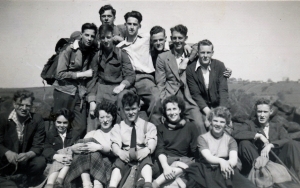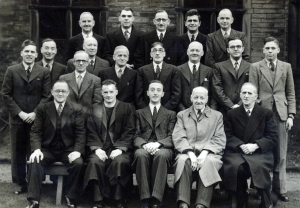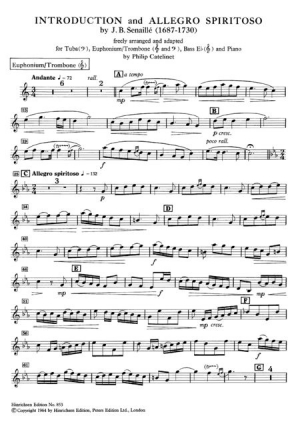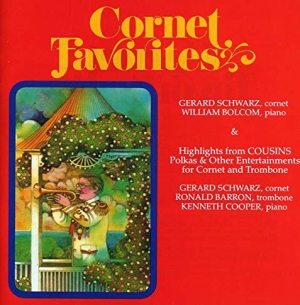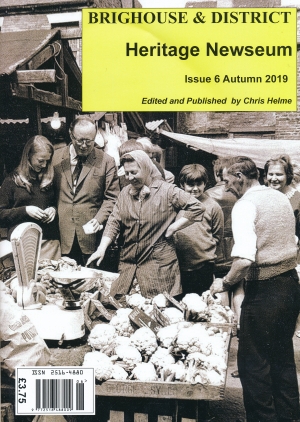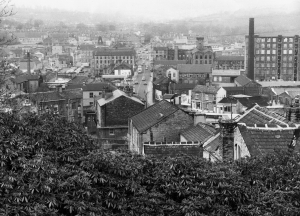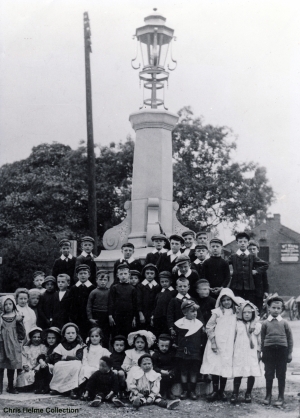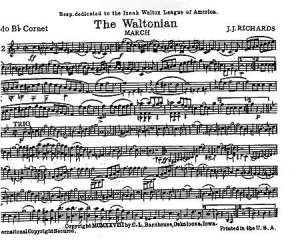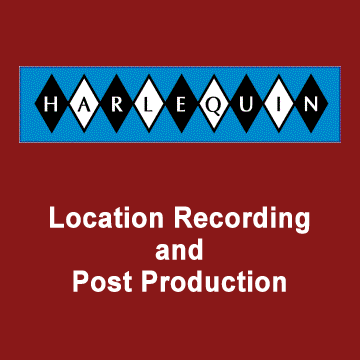Chris Helme
Arthur Wood (24 January 1875–18 January 1953) was an English composer and conductor, particularly famous for "Barwick Green", the signature theme for the BBC Radio 4 series The Archers.
Wood was born in Heckmondwike, Yorkshire, the son of a tailor. His father was a violinist in a local amateur orchestra and as a boy, Wood began to learn the violin, the flute and piccolo.
After his family moved to Harrogate in 1882, he was given flute lessons from Arthur Brookes, a member of a local spa orchestra. He left school at the age of twelve and two years later became organist of St Paul's Presbyterian Church in Harrogate. By age sixteen he had become the lead flautist, pianist and deputy conductor of the Harrogate Municipal Orchestra. Later he moved onto the Bournemouth Municipal Orchestra.
In 1903, at the age of twenty-eight, he progressed to become the director of music at Terry's Theatre, London. Wood conducted London theatre orchestras for over three decades, including the Apollo Theatre, the Shaftesbury Theatre, His Majesty's Theatre and the Theatre Royal, Drury Lane. He died in London on 18 January 1953.
He was the father of Peggy Ann Wood, an actor, director and theatre manager based in Bristol.
Wood was a prolific composer of works in a variety of categories, although he was self-taught in composition and orchestration. His first published work, the orchestral work Three Old Dances, was first published in 1902.
After this he became a staff composer for Boosey & Hawkes, for whom he wrote many orchestral suites and single works, many related to his upbringing. These include Three Dale Dances, the Yorkshire Moors Suite, A Lancashire Clog Dance and My Native Heath, from which his most famous piece "Barwick Green" came. Other orchestral works include his Concertino in A major, Widow Malone, An Oriental Scene and Fairy Dreams.
He also composed a number of stage musicals, such as Yvonne, Petticoat Fair, and Fancy Fair, the latter two dating from about 1918.
Apart from "Barwick Green", his works are now rarely performed.
We are featuring The Arcadians Overture on this week's show.
Enjoy
This photograph c:1950 was taken in the grounds of the Lightcliffe Congregational Church. These are members of the church men's group. Are you related to any of these gentlemen?
Jean Baptiste Senaillé (23 November 1687 in Paris – 15 October 1730 idem) was a French born Baroque composer and violin virtuoso. His father was a member of Les Vingt-quatre Violons du Roi. Senaillé studied under Jean-Baptiste Anet, Giovanni Antonio Piani and in Italy under Tomaso Antonio Vitali and imported Italian musical techniques and pieces into the French court. He wrote around 50 violin sonatas.
He is most well-known for a fast 2/4 movement from one of these sonatas, Allegro Spiritoso, which has had versions published transcribed for a wide variety of instruments, from violoncello to bassoon to euphonium.
In 1946 it was arranged for euphonium and brass band by Dr. Dennis Wright and is featured on this show with the euphonium section of the National Youth Brass Band of Great Britain with MD Roy Newsome in 1995.
Sorry there is no Sunday Bandstand show on September 8th. I have the joiners in replacing doors. With the banging, drilling and all the other noises a new show is not possible. Back to normal service the following week.
Clay Smith was born in 1878 in Greencastle, Indiana. His first documented musical activity involved playing E-flat cornet solos for exhibits at the 1893 Chicago World’s Fair. At some point he became proficient on the saxophone and trombone, which seems to have been his primary instrument for most of his career. His teachers included Alfred F. Weldon, Gardell Simons, and Hale A. Vander Cook. He performed with several famous bands, such as the bands of Hi Henry’s Minstrels, Wallace Brothers Circus, the Barnum and Bailey Circus, and the Ringling Brothers Circus. He was also featured trombone soloist at the 1904 St. Louis World’s Fair with Phinney’s Band.
With Guy E. Holmes, Smith formed the Apollo Concert Company, which toured on a vaudeville circuit. About 1914, he organized the Smith, Spring, and Holmes Concert Company, which made several recordings and toured Chautauqua and Lyceum circuits. Smith and Holmes collaborated on many compositions and arrangements for various instruments.
Chautauqua was an adult education movement in the United States, highly popular in the late 19th and early 20th centuries. Chautauqua assemblies expanded and spread throughout rural America until the mid-1920s. The Chautauqua brought entertainment and culture for the whole community, with speakers, teachers, musicians, showmen, preachers, and specialists of the day.[1] Former U.S. President Theodore Roosevelt was quoted as saying that Chautauqua is "the most American thing in America.
From all accounts, Smith was an accomplished and virtuoso trombone soloist. Many of his works reflect a need for technical and lyrical proficiency. Unlike Arthur Pryor, Leo Zimmerman, and other contemporaries who “headlined” as soloists with the major touring concert bands of the day, Smith spent most of his career on the Chautauqua and theatre circuits. It would appear that Chicago served as his home for at least the latter part of his life. He died there in 1930.
On this week's show we are featuring his duet for cornet and trombone The Cascades which was published c1904. A rarely performed duet these days.
Enjoy the show....
Taken during the 1970s from Healey Wood looking down Huddersfield Road towards the town centre. There have been many changes in this scene over the last 45 years.
Here is the Bailiff Bridge fountain and drinking trough which was formally handed over to the Hipperholme Urban District Council to be custodians of it. LadyJanet Firth, the wife fo Sir Algernon Firth of T.F.Firth Manufacturing Co Ltd, who donated and presented it left a sum of money to ensure that it would not become a financial burden to the rate payers.
Joseph John Richards was born August 27, 1878 in Cwmavon, Wales. His family immigrated to the United States four years later, settling in Peterson, Kansas. He began learning various brass instruments at the age of ten, progressing rapidly, playing in various amateur bands. At the age of nineteen he was appointed the leader of the Norton-Jones Circus Band, beginning a long career as bandmaster with numerous ensembles.
Richards’ first composition appeared in print in 1899; during this period, he began writing marches and other works, and certainly many of his early works were first performed by the bands that he led. His career as a circus bandleader culminated with his directorship of the Ringling Bros. Circus Band from 1911 through 1918.
During the circus off-seasons, Richards attended Kansas State Teachers College and the American Conservatory of Music. Beginning in the early 1920s, he taught school music and directed bands in various Illinois towns through 1944. In 1945, upon the death of Herbert L. Clarke, he was appointed director of the famed Long Beach, California Municipal Band, a post he held until 1950. Subsequently, Richards returned to Illinois in the spring and summer to lead the Mt. Morris Band while wintering in Long Beach. He died on March 16, 1956 in Long Beach.
Richards was highly regarded by his peers. He was elected to the American Bandmasters Association in 1939 and served as its president in 1948. He composed well over one hundred works that were published. The one we are featuring in this week's show is his 1928 march The Waltonian – one which still enjoys great popularity today..



